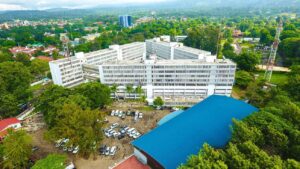- Uganda’s diaspora remittances have seen 13.4% jump, reaching $1.42 billion.
- Remittances continue to outshine foreign direct investment and official development assistance as the primary source of external finance for low and middle-income countries.
- Economies are leveraging diaspora remittances through innovative financial instruments such as diaspora bonds and policies aimed at financial inclusion to enhance their impact on development.
Diaspora remittances from Ugandans living and working abroad increased by 13.4 per cent in the 12 months ending January 2024. This surge, as reported by the Bank of Uganda’s Executive Director of Research, Mr. Adam Mugume, highlights the increasing role of diaspora inflows in the nation’s economy, reaching $1.42 billion, up from the previous $1.25 billion.
Such growth underscores the essential contribution of the Uganda’s diaspora remittances amidst a challenging global financial landscape.
Globally, remittances have emerged as a critical source of external finance for low- and middle-income countries (LMICs), overshadowing foreign direct investment and official development assistance throughout 2023.
The World Bank’s Migration and Development reports that diaspora remittances registered a 3.8 percent growth rate in 2023 across LMICs. This financial flow is vital, especially for regions such as Sub-Saharan Africa, where remittances are expected to have grown by approximately 1.9 percent to $54 billion, showcasing the indispensable economic lifeline they provide to developing nations.
Contributions from the Middle East, Europe, the Americas, and Africa have led to an increase in Uganda’s diaspora remittances, primarily for consumption purposes like education, medical care, and household expenses. This financial support helps stabilize household consumption and enabling investment activities within Uganda.
However, the World Bank warns of potential risks such as global inflation and low growth prospects, which might affect the real income of people living and working in foreign countries in 2024. Despite these challenges, projections indicate that remittances will continue to grow, serving as a vital source of development finance for LMICs.
Uganda’s diaspora remittances not only signify a remarkable growth trajectory but also illuminate the profound impact these funds have on the socioeconomic fabric of low- and middle-income countries (LMICs).
According to the Bank of Uganda, the rise to $1.42 billion in remittances showcases the resilience and support of the Ugandan diaspora community. This financial influx is a testament to the dedication and resilience of migrants globally, who, despite facing their own set of challenges, continue to support their home countries.
Read also: UNCTAD raises red flag as geopolitical tensions, climate change hit global trade
Resilience of diaspora remittances during crisis
The World Bank’s Migration and Development report sheds light on the broader implications of remittances in the global context, especially in the face of economic uncertainties such as inflation and subdued growth prospects.
The resilience of remittance flows during times of crisis reflects the crucial role they play in providing a safety net for families in LMICs. The anticipated growth of remittances, albeit moderate, signals a beacon of hope for countries reliant on these funds for development and poverty alleviation.
Looking ahead, the challenge and opportunity lie in maximizing the impact of diaspora remittances for sustainable development. The Bank of Uganda, along with international partners like the World Bank, cite the potential of remittances as a source of private external finance. Innovative financial instruments, such as diaspora bonds, are being considered to mobilize these remittances for large-scale development projects.
This strategic approach aims to enhance the utility of remittances, transforming them from mere financial support to key drivers of economic growth and development.
The evolution of Uganda’s diaspora remittances in the face of global economic pressures illuminates a vital aspect of financial resilience and interconnectivity in today’s world. The steadfast increase in remittances, as highlighted by the Bank of Uganda and supported by data from the World Bank, underscores the enduring bond between the Ugandan diaspora and their homeland. This connection not only fosters financial stability but also cultural and emotional ties that span continents.
In the broader spectrum, the steady flow of remittances to LMICs amidst global uncertainties like inflation and economic downturns showcases the diaspora’s role in economic sustainability. These funds, often sent back home, act as a lifeline, supporting education, healthcare, and the entrepreneurial ventures that drive local economies forward.
Moreover, diaspora remittances play a strategic role in enhancing the financial inclusion of communities. By providing families with access to capital, remittances encourage savings, investments, and participation in the formal financial system, laying the groundwork for long-term economic development.
As Uganda and other LMICs look to the future, the role of diaspora remittances in shaping economic landscapes is undeniable. With thoughtful policies and innovative financial solutions, these remittances can amplify their impact, supporting not just individual families but entire communities and nations on their path to prosperity and resilience.
This positive trajectory of Uganda’s diaspora remittance amidst global economic challenges underscores the resilience and importance of the diaspora’s financial contributions. The Bank of Uganda, alongside global institutions like the World Bank, recognizes the significance of leveraging these inflows for development finance, hinting at innovative approaches such as diaspora bonds to mobilize private capital.
As Uganda and other LMICs navigate the complexities of the global economy, the strategic utilization and encouragement of diaspora remittances will be paramount in ensuring sustainable development and economic stability.











